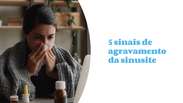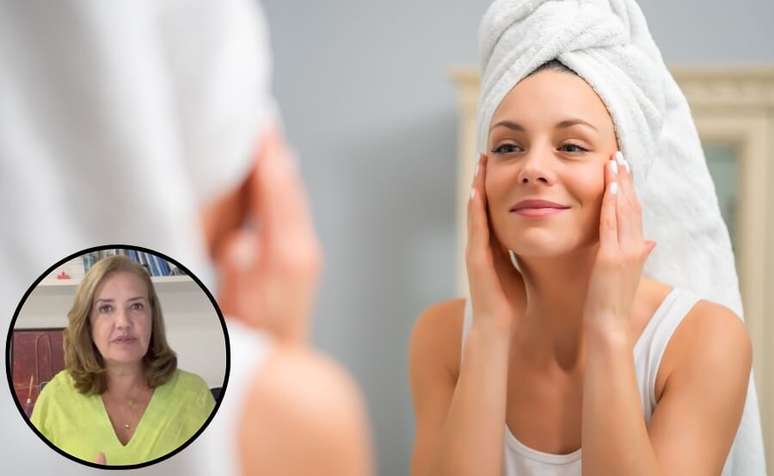Diet, sun exposure, stress and smoking are the main factors that influence acute skin aging
-
BY PARTICIPATING

Skin aging: find out how to treat the main factors
-
BY PARTICIPATING

Sinusitis: 5 signs of worsening
-
BY PARTICIPATING

Eduardo Suplicy thanks his children after revealing the cure for Parkinson’s with medicinal cannabis
Suddenly you look in the mirror and see an aging person: where do those wrinkles come from? And those bags under your eyes that weren’t there yesterday?
“Calm down, there might be a reason for faster aging. Inflammatory situations, when there is a sudden increase in free radicals such as infections, emotional stress, pain or illness, can quickly affect the skin. Or none of this and we simply age,” explains plastic surgeon Beatriz Lassance, member of the Brazilian Society of Plastic Surgery.
“The first thing to do is talk to that person in the mirror. How long has it been since you looked at yourself this way? Is life too busy, too many problems? Haven’t taken time for self-care, moisturizer or sunscreen in the morning? Have you drank water?” asks the doctor.
Food
The first point to understand faster aging is to look at lifestyle habits, especially in relation to diet.
“Simple carbohydrates like sugar are quickly digested and absorbed, arriving in the blood as glucose, which is what we call blood sugar. They are carbohydrates with a high glycemic index. Glucose must be removed from the blood immediately as it cannot affect the blood in any way. And a major war operation begins to solve this problem,” says Beatriz Lassance.
“In case of high blood sugar spikes, even for a short time, the body’s reaction against this glucose is so powerful that, in addition to this normal way of lowering blood sugar levels, enzymes are needed, which are not the usual ones, to help the process that generates the production of free radicals. In the skin, excess free radicals can damage the DNA of cells, causing less cellular activity, less production of collagen and elastic fibers, less activity of defense cells, less healing power, and also a greater tendency to skin cancer,” he explains.
Glycation of proteins
Yet, if all this were not enough, glucose reacts with the body’s proteins, a phenomenon called glycation, according to the specialist.
“Protein glycation is worsened by the presence of excess free radicals. Glucose can “stick” to hemoglobin – the glycated hemoglobin from your last check -, to fats, to DNA and even to our beloved collagen. In the short term, these effects are very noticeable. After a weekend of binging, like jackfruit, on alcoholic drinks and lots of sweets, we wake up bloated, with bags under our eyes and even a few extra pounds,” says the doctor.
External factors and sun
In the skin, in addition to endogenous factors such as the increase in free radicals and glycation, we have external factors. The biggest villain, in this sense, is the sun. Beatriz explains that skin exposed to the sun undergoes a sudden increase in the amount of free radicals, which have the function of causing defenses against the effect of these radiations, such as thickening of the dermis, increased production of melanin (a pigment that prevents sunlight ) rays from penetrating the skin), glycation, loss of elasticity of the skin, represented by wrinkles, blemishes and sagging.
“It’s called photoaging. Oxidative stress is so strong that it damages DNA and promotes the appearance of skin cancer,” she explains.
To smoke
“Cigarettes reduce blood circulation in the small vessels of the skin. Furthermore, glycated proteins have been found in cigarette smoke that enter directly into the bloodstream and are reflected directly on the skin,” the doctor emphasizes.
Fatigue
Psychological stress is linked to an increase in oxidative stress: it increases the production of cortisol.
“This warning hormone is linked to increased production of free radicals and decreased production of the antioxidant system. This ‘inflammation’ and ‘deflation’, ‘swelling’ and ‘deflation’ compromises the skin fibres, generates a cumulative effect of free radicals and glycation of collagen and elastic fibers and predisposes to skin sagging and ageing”, explains the specialist.
What to do?
“The first step is to breathe, look at yourself with love, as if you were your friend in the mirror; self-compassion is the right word! The combination of factors can reduce oxidative stress throughout the body and also on the skin,” says the doctor.
“When it comes to food, start worrying about what you eat. Researching the glycemic index of foods is easy, there is a lot of information on the internet. Avoid foods with a high glycemic index such as refined sugar, white flour, alcohol. And, smiling, make healthy and delicious choices. Small changes can make a big difference. Asking a nutritionist for help is a great start. A trend I believe in today is behavioral nutrition, which talks about food, the pleasure of eating, awareness in eating,” she explains.
Drink water and exercise
To reduce swelling, according to your doctor, the best thing to do is drink lots of water! “Taking diuretics doesn’t help at all, it overloads the kidneys, since the body needs this excess water to reduce inflammation,” he says.
Another action that helps is physical exercise. “Also understand that it is the greatest stimulant of our antioxidant system. Exercise causes the production of free radicals, but to protect itself, the body produces natural antioxidants on a much larger scale, which protect the entire body from these free radicals. Therefore, those who do physical activity are less likely to develop cardiovascular diseases, hypertension, degenerative neurological diseases and live longer,” he explains.
“Move more, go to parks, see different places, visit friends, forget about escalators, climb stairs, walk. Physical activity works at any intensity, moving more will make you more willing to move on to exercise,” she points out.
The importance of sleep
Another powerful antioxidant is sleep. The expert claims that patients with insomnia have greater oxidative stress.
“Our grandmother already talked about good sleep, sleeping makes you lose weight, while we sleep we grow. Yes, it’s all true, good quality, restful sleep is antioxidant. If necessary, seek professional help,” she says.
html[data-range=”xlarge”] figure image img.img-b5e351cb3132dcdff630c5259d60d603i9eqk612 { width: 774px; height: 476px; }HTML[data-range=”large”] figure image img.img-b5e351cb3132dcdff630c5259d60d603i9eqk612 { width: 548px; height: 337px; }HTML[data-range=”small”] figure image img.img-b5e351cb3132dcdff630c5259d60d603i9eqk612, html[data-range=”medium”] figure image img.img-b5e351cb3132dcdff630c5259d60d603i9eqk612 { width: 564px; height: 347px; }HTML[data-range=”small”] .article__image-embed, html[data-range=”medium”] .article__image-embed {width: 564px; margin: 0 automatic 30px; }

Since it is impossible to end stress, the doctor says that it is necessary to find chemical means to stop the production of cortisol and increase serotonin and endorphins.
“Meditation is more than proven to reduce oxidative stress globally. Choose an activity, preferably one that uses energy, that keeps your brain thinking about something different from your routine. Dancing, beach tennis, fighting, music. TV is very passive, avoid it,” she suggests.
Skin care
Finally, the doctor reiterates the importance of starting and maintaining a skin care routine.
“Cleanse and moisturize your skin before going to bed and apply sunscreen in the morning. So simple. Obviously we have a multitude of active ingredients, creams and technologies that can help in this detoxification process and fight skin aging, but simple measures already make a lot of difference”, explains the doctor.
Nutritionist Luisa Wolpe Simas, integrated nutrition consultant at Biotec Dermocosméticos, reminds that the use of supplements can also be interesting to help maintain healthy skin.
“To improve the appearance of the skin, substances for oral use can be recommended, such as FC Oral, which has an important anti-inflammatory action, and nutrients such as Exsynutriment to stimulate collagen together with Vitamin C, Resveratrol and In.Cell”, underlines the nutritionist .
“And look for a specialist. The better the metabolism and quality of collagen, the more effective any aesthetic procedure will be. The key to aesthetic procedures is collagen stimulation. Patient with a healthy lifestyle with a balanced diet, who practices physical activity, adequate quality of sleep, has cells with a better metabolism, capable of responding better to any stimulus. But the concern shouldn’t just be the skin. Think about your lifestyle: good skin quality depends on this,” concludes the plastic surgeon.
inspires transformation in the world of work, in business, in society. Compasso, a content and connection agency, is born.
Source: Terra
Ben Stock is a lifestyle journalist and author at Gossipify. He writes about topics such as health, wellness, travel, food and home decor. He provides practical advice and inspiration to improve well-being, keeps readers up to date with latest lifestyle news and trends, known for his engaging writing style, in-depth analysis and unique perspectives.




![Everything starts here in advance: Gaspard betrays Maya?… What awaits you in the week of October 20-25, 2025 [SPOILERS] Everything starts here in advance: Gaspard betrays Maya?… What awaits you in the week of October 20-25, 2025 [SPOILERS]](https://fr.web.img2.acsta.net/img/06/67/0667caecc03feaf0952a883bf2751448.jpg)


